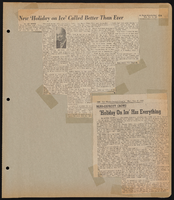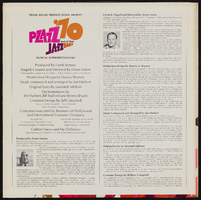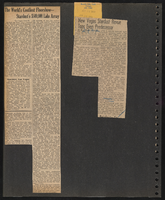Search the Special Collections and Archives Portal
Search Results
Equal Rights Nevada Collection
Identifier
Abstract
The Equal Rights Nevada (2000-2002) collection is comprised of organizational records documenting the group’s unsuccessful fight against Question 2, a referendum voted upon in 2000 and 2002 to amend Nevada’s state constitution to forbid same-sex marriage. It includes campaign files, financial records, publicity, correspondence, ephemera, and other supporting documentation from national and regional marriage equality organizations.
Archival Collection
Nellis Air Force Base Photograph Collection
Identifier
Abstract
The Nellis Air Force Base Photograph Collection contains photographs of Nellis Air Force Base and its predecessor, the Las Vegas Army Airfield, as well as photographs of Rockwell Field and McCarran Airport in Las Vegas, Nevada from 1926 to 1980. The materials contain photographs of military aircraft, hangars, buildings on the base, and aerial photographs of Las Vegas and the surrounding area. The materials also include photographs of the entrance of McCarran Airport, U.S. Senator Pat McCarran, and a mail plane arriving at Rockwell Fields in 1926.
Archival Collection
Urban Chamber of Commerce of Las Vegas, Nevada Records
Identifier
Abstract
The Urban Chamber of Commerce of Las Vegas, Nevada Records date from approximately 1980 to 2009 and contains the organizational records of the Urban Chamber of Commerce of Las Vegas, Nevada (UCC), one of the many chambers of commerce in the Las Vegas, Nevada area. The mission of the Urban Chamber of Commerce is to create and foster an environment that promotes development of members and Black-owned businesses. The collection is comprised of publications, financial and administrative records, various event information, and photographs of events and membership.
Archival Collection
Rita Deanin Abbey Exhibition Catalogs
Identifier
Abstract
The Rita Deanin Abbey Exhibition Catalogs (1975-1991) are comprised primarily of exhibition catalogs featuring Abbey's art at various museums and international exhibitions including the Palm Springs Desert Museum, the University of New Mexico Art Museum, Biennale Internationale d’Email Laval, and the International Exhibition of Enamelling Art in Japan. The collection also contains invitations to Abbey's art shows at the University of Nevada, Las Vegas as well as a copy of Abbey's curriculum vitae. Also included are select issues of
Archival Collection

Transcript of interview with Billy Paul Smith by Claytee White, October 3, 2013
Date
Archival Collection
Description
Chemist, mathematician, and health physicist Billy Paul Smith donates time to tutor young people in hopes of attracting more youth into the fields of math and science. Born in 1942 and schooled in segregated black schools in Shreveport, Louisiana, and Texarkana, Texas, he graduated from high school at age fifteen and enrolled at Prairie View A&M University, where he trained with the Reserve Officer Training Corps (ROTC) and earned his Bachelor’s degree in chemistry and in 1964 his Master’s degrees in chemistry and math. Most young U.S. Army officers in 1964 went to Vietnam, but Billy’s math and science background steered him to the Army Chemical Corps, where he was quickly selected to join a new team. The team was to develop responses to nuclear weapon accidents and worked under the Defense Atomic Support Agency (DASA) in Albuquerque, New Mexico. At the same time, Billy completed the Weapons Ordinance Army course on classified information relating to the U.S. nuclear weapons arsenal. In this interview, Billy talks about his service with DASA and his subsequent twenty-seven years working at the Nevada Test Site in a variety of positions with Reynolds Electrical and Engineering Company, Inc. (REECo), a company that had “percentagewise more blacks in management positions than any other [Las Vegas] company.” He experienced the quiet racism of Las Vegas residential segregation when he tried to purchase a house in a neighborhood he liked and the unexpected kindness of the REECo general manager, Ron Keen, who made sure the Smith family could live where they wanted to live. He talks about Area 51 and explains underground testing activity and offers the scientific and ecological reasons why scientists deemed Yucca Mountain safe to store nuclear waste. After retiring at fifty-two, Billy and a colleague formed an independent instrumentation company, which, from 1995–2005 provided and calibrated radiological measurement and detection instruments for the decommissioning and closure of the Rocky Flats nuclear plant in Golden, Colorado. During that time, Billy rented an apartment in Boulder, but he and Jackie maintained their Las Vegas home, where they still reside. Billy shares memories of places he and his wife used to enjoy on the Westside and tells of their longtime friends in the black community. He also talks about developing his philosophy of philanthropy through Alpha Phi Alpha Fraternity and discusses becoming a member of the Knowledge Fund Advisory Council for the Governor’s Office of Economic Development (GOED) and the advisory council for the Nevada System of Higher Education.
Text

Interview with Wayne Albert Violette, January 12, 2005
Date
Archival Collection
Description
Text

Interview with Raymond Chester Harbert, April 3, 2006
Date
Archival Collection
Description
Text



